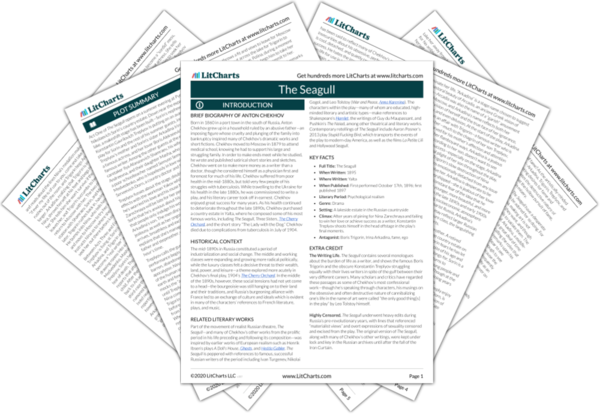The gull represents Nina Zarechnaya’s loss of innocence and freedom. Konstantin Treplyov—hopelessly mired in unrequited love for Nina, his muse and neighbor—brings her a gull that he has “slain” with a rifle. He drops the bird at her feet as a kind of offering, warning her that he will soon “kill [him]self the very same way.” When Boris Trigorin approaches Nina and sees the gull, he notes that the dead gull is a compelling symbol he’d like to use in a story: a story about a girl who grows up, just like Nina, on the shores of a lake, “happy and free” as a bird, until a man who has “nothing better to do” comes along and destroys her—just as Treplyov destroyed the gull. Though Treplyov hoped to give Nina the gull as an expression of how she had destroyed him with her indifference, it is transformed into a symbol of Nina’s own destruction at the hands of a man who cares little for her—Trigorin himself. As the play unfolds, Nina follows Trigorin to Moscow in hopes of living an idyllic, artistic life as his mistress and muse, only to find herself impoverished and unable to find work as an actress. She has a child with Trigorin, the child dies and Trigorin abandons her. After this, Nina sends Treplyov letters which she signs “The Gull,” implying that she, too, has come to view herself as akin to this lifeless bird, as she has sacrificed her wellbeing and endured great tragedy just to follow Trigorin and conform to his whims.
Years later, when she returns to the countryside utterly defeated, she reunites with Treplyov, but she is no longer the beautiful, carefree girl she once was. Nina is confused and depressed as she recounts to Treplyov her doomed affair with Trigorin and the years of mediocrity, failure, and humiliation which have followed it. Even later in the play, it is revealed that Trigorin ordered Shamraev to stuff Treplyov’s slain gull and display it at Sorin’s country home—further suggesting that Trigorin has found some kind of reassurance or even perverse delight in his power to subjugate and control Nina. Ultimately, in spite of her fears that she has become the gull, Nina rebels against this identity when she says “I’m a gull. No, that’s wrong.” Nina has survived through a harsh industry and an even harsher personal life. Though she has suffered immensely in her relationships with Trigorin and Treplyov, she rejects the notion that she, like the gull, is doomed to a state of lifelessness and paralysis due to her struggles.
The Gull Quotes in The Seagull
TREPLYOV: (Enters bare-headed, carrying a rifle and a slain gull.) You’re alone here?
NINA: Alone. (TREPLYOV lays the gull at her feet.) What does this mean?
TREPLYOV: I did something nasty, I killed this gull today. I lay it at your feet.
NINA: What’s wrong with you? (Picks up the gull and stares at it.)
TREPLYOV: (After a pause) I’ll soon kill myself the very same way.
TRIGORIN: Just jotting down a note… A subject came to mind… (Putting away the notebook.) Subject for a short story: on the shores of a lake a young girl grows up, just like you; loves the lake, like a gull, is happy and free, like a gull. But by chance a man comes along, sees her, and, having nothing better to do, destroys her, just like this gull here.
SHAMRAEV: (To Trigorin.) Hey, Boris Alekseevich, that thing of yours is still here.
TRIGORIN: What thing?
SHAMRAEV: A while back Konstantin Gavrilovich shot a gull, and you asked me to have it stuffed.
TRIGORIN: Don’t remember. (Thinking about it.) Don’t remember!
NINA: You can’t imagine what that’s like, when you realize your acting is terrible. I’m a gull. No, that’s wrong… Remember when you shot down a gull? By chance a man comes along, sees, and with nothing better to do destroys… Subject for a short story. That’s wrong… (Rubs her forehead.) What was I saying?... I was talking about the stage. I’m not like that now… Now I’m a real actress… […] Now I know, understand, Kostya, that in our work—it doesn’t matter whether we act or we write—the main thing isn’t fame, glamour, the things I dreamed about, it’s knowing how to endure.












